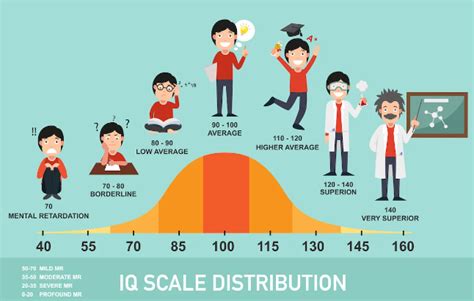In the realm of cognitive development, the concept of IQ has sparked considerable interest among educators, psychologists, and parents alike. IQ, or Intelligence Quotient, serves as a measure of an individual’s intellectual ability and potential. Understanding the average IQ for an 11-year-old is crucial for parents and educators to foster cognitive growth and nurture their intellectual development.

What is the Average IQ for an 11-Year-Old?
According to the Wechsler Intelligence Scale for Children (WISC-V) published by the Psychological Corporation in 2019, the average IQ for children aged 11-11 years and 11 months is 100. This indicates that the majority of children within this age group fall within the “average” range of cognitive ability.
Factors Influencing IQ
It is important to note that IQ is not solely determined by genetic factors. Environmental influences, such as socioeconomic status, access to education, and exposure to stimulating experiences, can significantly impact a child’s cognitive development.
Range of IQ Scores and Cognitive Abilities
IQ scores typically fall within a bell-shaped distribution, with the majority of individuals scoring near the average of 100. The following table provides an overview of the range of IQ scores and their corresponding cognitive abilities:
| IQ Range | Cognitive Abilities |
|---|---|
| 130+ | Superior intellectual functioning |
| 120-129 | High intelligence |
| 110-119 | Above average intelligence |
| 90-109 | Average intelligence |
| 80-89 | Below average intelligence |
| 70-79 | Borderline intellectual functioning |
| 55-69 | Mild intellectual disability |
| 25-54 | Moderate intellectual disability |
| Below 25 | Severe intellectual disability |
Implications for Parents and Educators
Understanding the average IQ for an 11-year-old empowers parents and educators to:
- Identify potential learning difficulties: Children with IQ scores significantly below average may require additional support and tailored educational strategies.
- Foster cognitive development: By providing enriching experiences, such as reading, puzzles, and engaging discussions, parents and educators can stimulate cognitive growth and enhance IQ scores.
- Set realistic expectations: Parents and educators need to recognize that every child has their own unique cognitive strengths and weaknesses. Setting realistic expectations based on an individual’s IQ can help promote self-esteem and motivation.
Effective Strategies for Nurturing Cognitive Development
To nurture cognitive development in 11-year-olds, consider implementing the following strategies:
- Encourage reading: Make reading a regular part of your child’s routine. Provide access to a variety of books that cater to their interests and challenge their cognitive abilities.
- Engage in thought-provoking discussions: Have meaningful conversations with your child about current events, science, and history. Encourage them to express their ideas and ask questions.
- Provide puzzles and games: Introduce your child to puzzles, board games, and video games that require problem-solving, critical thinking, and strategic planning.
- Foster a growth mindset: Emphasize the importance of effort, perseverance, and learning from mistakes. Encourage your child to embrace challenges and view mistakes as opportunities for growth.
Tips and Tricks for Parents
- Create a stimulating home environment: Provide your child with a home environment rich in books, games, and puzzles. Encourage them to explore different hobbies and interests.
- Encourage social interactions: Engage your child in social activities such as clubs, sports, and playdates. Interacting with peers can enhance social skills and foster cognitive development.
- Seek professional guidance if needed: If you have concerns about your child’s cognitive development, don’t hesitate to seek professional guidance from a child psychologist or educational specialist. They can provide tailored advice and support.
Step-by-Step Approach to Enhancing Cognitive Development
- Step 1: Assess your child’s current cognitive abilities. This can be done through standardized testing or observations of their academic performance and problem-solving skills.
- Step 2: Identify areas for improvement. Pay attention to subjects or skills where your child exhibits strengths and weaknesses. Focus on enhancing their weaker areas.
- Step 3: Implement appropriate strategies. Choose evidence-based strategies that align with your child’s learning style and individual needs.
- Step 4: Monitor progress and make adjustments. Regularly assess your child’s progress and make adjustments to your strategies as needed.
- Step 5: Foster a positive and supportive environment. Provide your child with a supportive environment where they feel encouraged and motivated to learn and grow.
Conclusion
Understanding the average IQ for an 11-year-old is an important aspect of cognitive development. By embracing a comprehensive approach that encompasses effective strategies, tips and tricks, and a step-by-step approach, parents and educators can nurture the cognitive growth of their children and pave the way for their future success.
Remember, every child is unique, and their cognitive development should be nurtured in a holistic manner, considering their individual strengths and challenges. By working together, parents and educators can create a supportive and stimulating environment that fosters cognitive growth and empowers children to reach their full potential.
